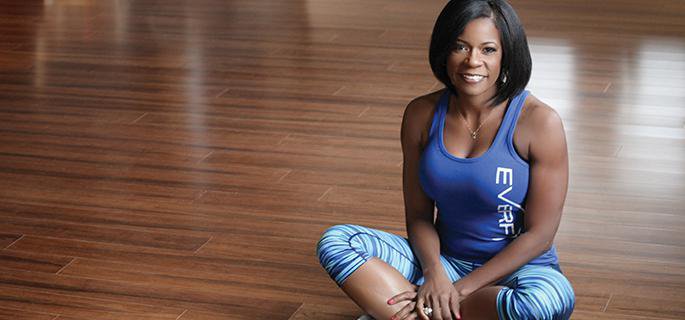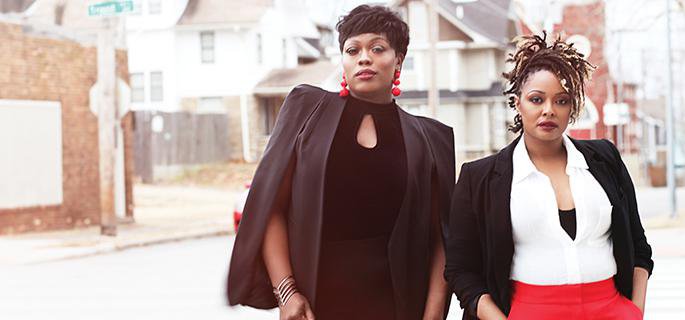For Adrienne Haynes, the road to owning a business began long before she enrolled in law school.
The first steps on that journey were taken in high school. Haynes, now the managing partner of SEED Law, a Kansas City firm specializing in serving entrepreneurs, was a teenager helping a businessman run an ice cream shop and a health food store.
“I enjoyed the opportunity to watch him enjoy his passion and make enough money to employ people like me,” Haynes said. “It was in that experience that I discovered entrepreneurship is a ‘thing’… and it allows people to explore their passions without working for someone else necessarily.”
With that experience as the trigger, Haynes later studied entrepreneurial law at the University of Missouri-Kansas City School of Law, with the goal of running her own business and helping others do the same. Hers is one of many stories in a comprehensive Kansas City Fed report that shows business ownership by black women is by far the fastest-growing segment of American entrepreneurship, soaring roughly 180 percent since 2000.
In addition to national survey results and data from numerous sources, the report—“Black Women Business Startups”— includes direct feedback from five focus groups involving 34 black women who own businesses in the Federal Reserve’s Tenth District. The report provides data-driven portraits of black women business owners and shares insight into their motivations, challenges and concerns.
The report was compiled by Senior Community Development Advisor Dell Gines, who also led the focus groups in Denver, Kansas City, Oklahoma City, Omaha and Wichita.
“The high growth rate of businesses owned by black women provides policymakers and economic developers a unique opportunity to develop policy and programming to accelerate and expand the economic impact of these businesses in their local economies,” Gines wrote in the report. “However, for policies and programs to be effective, policymakers and economic developers need a greater understanding of this group of business owners. The objective of this report is to increase this understanding.”

The U.S. Census Bureau’s Survey of Business Owners shows that from 2000 to 2012—the latest year for which data were available for this report—the number of businesses owned by black women increased 179 percent, compared with growth of 52 percent for all women-owned businesses and 20 percent for all businesses. Sales receipts at businesses owned by black women more than doubled from 2002 to 2012, from $20 billion to $42 billion. An update of the Census Bureau survey, with data up to 2017, is expected to be available soon.
“The data is clear: Investing in the growth and development of African-American female entrepreneurs pays off,” said Christina Long, president and chief executive officer of Create Campaign Inc., a Kansas organization that helps urban entrepreneurs and works to spur minority business development. “Enhancing the potential within this demographic will help cultivate a more successful ecosystem for all.”
At the same time, feedback from black women business owners shows that many face such challenges as access to credit or capital, the lack of support systems, and the desire for greater general business knowledge. Dawn Rattan, owner of EverFit in Shawnee, Kan., said she had to acquire certain business skills on the fly when she opened her “boutique gym” in 2015. Often that meant balancing her passion for fitness with such stark realities as managing overhead costs and negotiating prices with contractors.
“For me, it’s really about rolling with your brain instead of your heart,” Rattan said, explaining what she has learned from owning a startup business. “It’s about just being business-minded instead of being emotionally driven … learning to say ‘No’ and walk away. Really it’s taken me a while to do that.”
The Kansas City Fed report also points out that businesses owned by black women tend to be significantly smaller on average than other business ownership identified by race and gender. However, the report cites research showing that these “microbusinesses” provide valuable contributions to local economies by helping increase entrepreneurial activity. That activity boost, in turn, is associated with faster local economic growth.
Profiles in ownership
Included in the Kansas City Fed’s report are survey results and other snapshots that convey some of the entrepreneurial characteristics and circumstances of black women who own businesses.
Among them:
- Black women business owners mostly are between the ages of 35 and 54.
- The large majority of these women are first-time business owners.
- At least 50 percent of the owners in this group used personal or family savings to start their businesses.
- Many of these owners have difficulty accessing credit and face capital constraints, according to the Federal Reserve System’s 2016 Small Business Credit Survey. The black women in that survey also reported being less likely to receive some or all of the financing they requested, and they are significantly more likely to not apply for financing because they already are discouraged borrowers.
- For business ownership within racial or ethnic groups, black women were the first to make up more than 50 percent of their ethnic group’s total business ownership. By comparison, white women comprise 33 percent of business ownership in that ethnic group.
- These owners are likely to work part time in their business and use it as a secondary source of income.
Motivations, aspirations, challenges
In the focus groups detailed in the Kansas City Fed report, 34 business owners shared feedback across these topics:
- What motivated you to start a business?
- What challenges did you face?
- What support did you receive?
- What resources or information would you recommend for startups?
On startup motivation: Focus group participants described “push” and “pull” themes that drove or compelled them to start businesses. For example, for several women, negative workplace treatment, unpleasant employment experiences or general workplace dissatisfaction helped “push” them into starting their own business. For others, the “pull” to start a business resulted from their passion for a particular line of work, the emergence of a specific opportunity, or the desire for greater flexibility and better work/ life balance.
“I was in the cable industry for about 12 years, and I was laid off,” said Tiffany Cody, co-owner with Aisha Bullocks of Smash Glam, a photography business with operations in Topeka, Kan., and the Kansas City area. “It broke my heart, and I made a decision that I would never spend another day making someone else’s dreams come true while I ignored my own.”
So Cody decided to pursue her passion for photography full time. That decision led to a partnership with Bullocks, who had worked in project management and the beauty industry.
“We were really able to gain support from each other,” Bullocks said. With support from their families, the two made a commitment “… to be serious about our business and move in the direction of growing our business.”
On challenges: Financing was seen as a major business challenge. This was expressed as a general lack of financing, a lack of venture capital for certain high-growth businesses and a lack of financial management expertise.
The Fed’s Small Business Credit Survey found that among black women who own businesses the greatest financial challenges were in funds for expansion and operating expenses. In response to these challenges, the survey found, black women owners were more likely to make a late payment, use personal funds, negotiate payments with their lender or let their debt go into collection.
“I’m (running a business) out of my own pocket, funding it myself off my labor,” a focus group participant commented. “Sometimes it’s hard when you do it like that, because you don’t have everything in place to be successful.”
Sometimes getting potential investors to believe in your business can be a challenge.
Carlanda McKinney started a bra company in recent years but later formed a partnership with another woman business owner to form Kansas City-based Raxxo, which leverages a technology platform for customized clothing. “This has morphed from a bra company to a tech startup, because our platform can be used for anything … We’re just starting with bras,” McKinney said. Getting that message across in meetings with potential investors—the majority of whom are male—has been a challenge for a women-led business, she said. Men tend to “get stuck on bras and don’t see the bigger picture,” McKinney said. “I’m starting to see as I talk more about the tech and less about the bras, I’m getting less blowback.”

On support and resources: Two other big challenges business owners said they faced were a lack of general business information and a lack of mentoring when they started their business. “I really didn’t have any support, and I didn’t know where to go,” one focus group participant said. “A mentor would have been amazing.”
Rattan said she launched EverFit with support from her husband, who is a lawyer, and advice from a “business coach” at a local community college. In addition to running her fitness business, Rattan is responsible for payroll, marketing and other duties for her family’s retail liquor business in Kansas City, Kan. Because those businesses are “two extremes” with different goals and challenges, she has found insight and support through networking with other independent gym owners. For those seeking to start a business, she recommends that they talk to many people who are established in that field, and to consider experimenting with a “pop-up” business model before being locked into commitments such as a long-term lease.
“Don’t rush,” she said. “Rushing (to open the business by a certain date) caused me to make some bad decisions. Crunch the numbers. Don’t just paint a best-case scenario. Also do a worst-case scenario.”
Haynes of SEED Law in Kansas City said that professional networking is an important element of gaining support and growing a business.
“The pursuit of entrepreneurship is always challenging, but I’ve been really fortunate to have strong support systems here in town,” said Haynes, who has been instrumental in building the Multicultural Business Coalition in Kansas City as well as a network of black women attorneys. “I’ve been fortunate to not only enjoy the resources of these organizations but also to help develop them.”
Moving forward
Even as obstacles remain, participants in the report and focus groups said they were encouraged to see other black women face similar experiences as they grow their businesses. That outlook is important, Gines said, noting that the report should be instructive for those interested in business development in their communities.
“The takeaway from this report, at the 10,000-foot level, is that diversity matters, even in how you look at small business development, because when you look at it as a whole, you might miss some of the nuances that impact communities at the local level,” Gines said. “When you really want to see how small business impacts particular communities, you have to go deeper.”
Lee Gash-Maxey, executive director of the Colorado Black Chamber of Commerce, sees the rising growth and visibility of black women entrepreneurs as inspiring.
“I’m encouraged by the growing number of black women starting small businesses in our area,” Gash-Maxey said in the report. “This trend continues the legacy of black women, who’ve always found creative ways to take care of their families. It bodes well for our community because they’re making positive contributions … as role models, as business leaders, as empire builders, as game changers, as policy influencers and as decision makers. Black women who own small businesses are making a difference in their lives and in our community.”FURTHER RESOURCES
Download the full report on black women owned businesses, share your feedback and learn more about the Kansas City Fed’s Community Development work.
